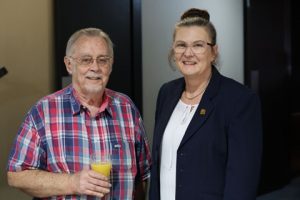Henceforth, Akademia’s media centre will house the Nongqai-archive
Published on: 27 March 2024
Henceforth, Akademia will be the home for the archive of the South Africa Forces’ history magazine, Nongqai. This cooperation between the institution and *Nongqai was announced in a magnificent manner on Tuesday 26 March in Centurion.
This special collection contributes to the advancement and expansion of Akademia’s media centre. The media centre already has the collected works of amongs Joost van den Vondel, NP van Wyk Louw, Dr Natie van Vuuren and Prof. Edith Raidt.
During this launch event various roleplayers had the opportunity to share their thoughts on the collection with the guests. These roleplayers included Dr Willem Steenkamp (chief operating officer and co-editor of the Nongqai magazine), Dr Heinrich Matthee (holder of the honorary chair in safety studies at Akademia), Jan de Klerk (archivist of the Nongqai magazine) and Lianda Coetzer (Akademia librarian).
A lot of reflection about the impact and value of the South African forces was done during this event. In light of this the force’s biggest, but mostly unknown moments, as it is recorded in the archives, are placed on the forefront.
One such an event happened in the late eighties in Pretoria during a visit by top leaders of the then Soviet Union. During this event, the local munitions industry impressed their international peers with their resourceful operating practices. The latter refers to the practice to replace the motors of the South African air forces’ old Mirage fighter planes with specially converted engines similar to the MIG-29 fighter planes. The prototype of this “Super Mirage F1” performed excellently on international air shows. Interestingly enough was the design studios of the joint team of aeronautical engineers of South Africa and the Soviet Union then housed in Moscow – this while the international arms ban is still in full swing.
The special collection will be catalogued by the staff of the Akademia media centre and ensures greater access to the broader community, especially researchers. Until this process is completed, interested parties can visit Nongqai’s website. Expect for interesting editions, the collections will contain whole party ebooks.
More on the Nongqai magazine
The Zulu word “nongqai” translated as “the king’s powers” and dates back to the colonial era. During this time policemen were referred to in this way during the Natal colony. In 1907 the police corps created their own magazine within their own ranks with the name, Nongqai. With the establishment of the Union Defence Force and the amalgamated South African Police Service in 1913, there was a mutual decision to use this name for the new combined magazine of all the forces – including the police, the army and the correctional service.
During 2010 the retired police brigadier, Hennie Heymans, revived the magazine as an online magazine as a private initiative. The goal of the magazine is two-fold, firstly to help preserve the history of the different forces and secondly to make access to information easier.
Send an email to Steenkamp or Coetzer for more information.
*Nongqai Media is part of the Nongqai Trust, a non-profit enitity. The Trust is also registered at the South African Revenue Service (SARS) as a Public Benefit Organisation (PBO).


